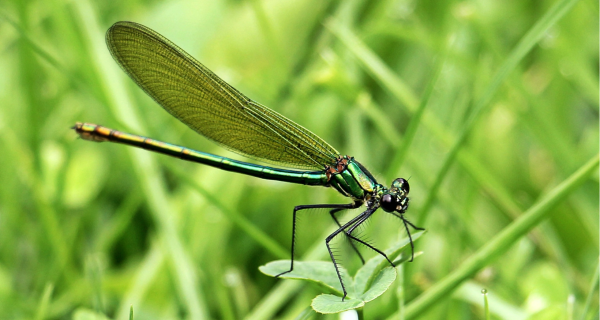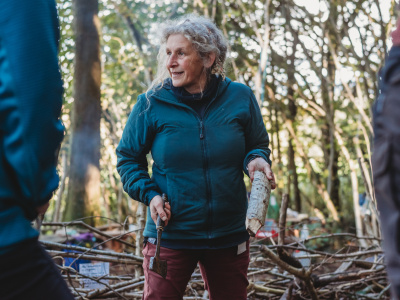Insect Week 2023
19 Jun 2023

A green iridescent damselfly perching on a leaf
This week is Insect Week, a celebration organised by the Royal Entomological Society to honour “the little things that run the world!”
In the UK alone we have over 24,000 species of insect! Our insects are diverse, with adaptations which allow them to live in almost every habitat there is, from woodlands to brick walls and from rivers and streams to the tops of the trees. However, insects across the world are at risk from threats such as habitat loss, pollution and climate change. And the UK is no exception to this worrying trend; a study last year revealed that the UK’s flying insects have declined by around 60% since 2004.
While this is very concerning, and potentially disastrous for our ecosystems, there are lots of things that we can do to help!
A space for insects
If you have a woodland, garden or other outdoor space, there are many ways to support insects to thrive in your patch, including:
- Cutting your grass less – longer lawns provide habitats for insects such as grasshoppers and true bugs, reducing mowing gives wildflowers such as daisies and dandelions a chance to bloom, providing a vital food source for many insect species.
- Growing insect-friendly native plants – the more plant diversity you have, the more species of insect you will be supporting, as different insects prefer different plants. Consider growing plants that have fragrant or brightly coloured flowers, as these are often attractive to pollinating insects.
- Consider water – a pond makes a fantastic habitat for insects like dragonflies and water beetles. If you don’t have the space for a pond, you can still help insects by providing shallow dishes of water lined with pebbles on which insects can rest to have a drink without the risk of drowning.
- Create a log pile – rotting wood provides both a habitat and food source for many invertebrates, so a log pile is an ideal way to create space for nature in your garden.
There are so many more ways to transform your garden into an insect haven, so why not surf the web for ideas or have a look at your own space and see what you can come up with?
Other ways to help
Even without your own green space, there are many ways that you can act to protect our insects.
- Shop local and organic – organic farms have lower emissions and are less likely to pollute soil and waterways. Additionally, locally grown produce has a smaller environmental footprint, and buying local produce supports famers in your area to protect the biodiversity on their land.
- Take part in citizen science – if you want to make a difference, why not help scientists gather data so they can better understand the environment and the threats it faces. UK invertebrate charity Buglife are currently running a survey called ‘Bugs Matter’ where they are asking members of the public to count the insects that they see. This data can then be used to give a better picture of insect declines and of where conservation efforts are succeeding. For more information about the Bugs Matter survey, visit the Buglife website.
- Write to your local council or MP – the local decision makers have the potential to make a big change when it comes to supporting nature. Whether you have a specific issue in mind, such as asking the councils to stop mowing roadside verges, or whether you just want to express your support for nature, writing to your local council will provide evidence that nature is important for the people!
- Think about ways that you can reduce your own carbon footprint – why not have a think about your own environmental footprint, and whether there are any actions you can take to reduce your impact? The WWF have a free carbon footprint calculator that can help you to understand how your lifestyle might impact your own carbon footprint.
If you want to find out more about insects and how to help them, there are loads of great resources on the internet, including on the Insect Week, the Royal Entomological Society and Buglife websites.
We hope you have a wonderful Insect Week and that you decide to take action to protect insects today!

